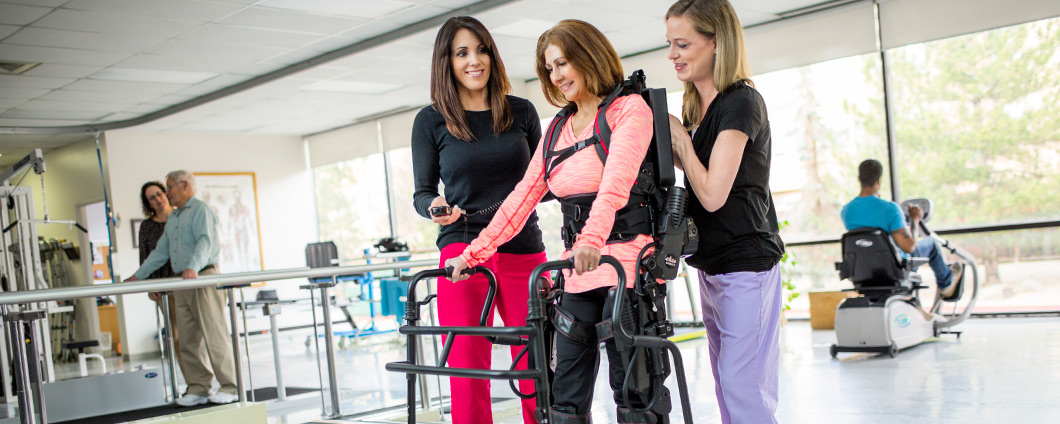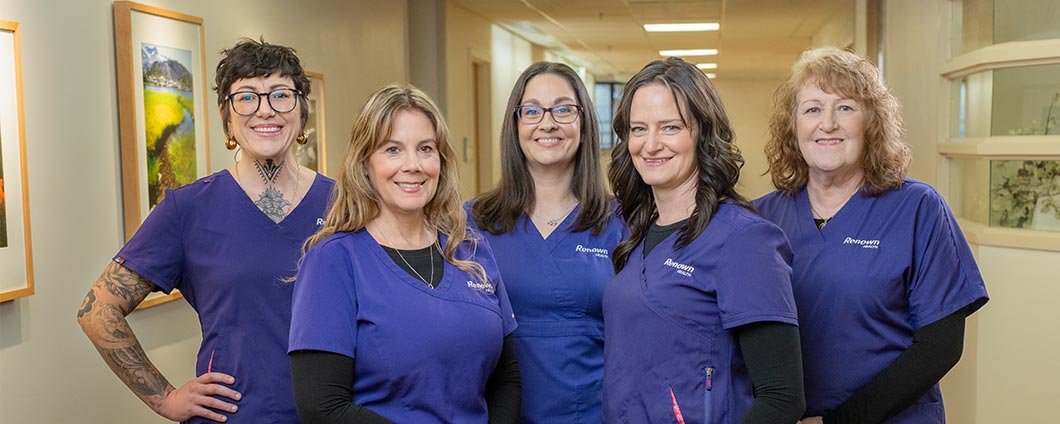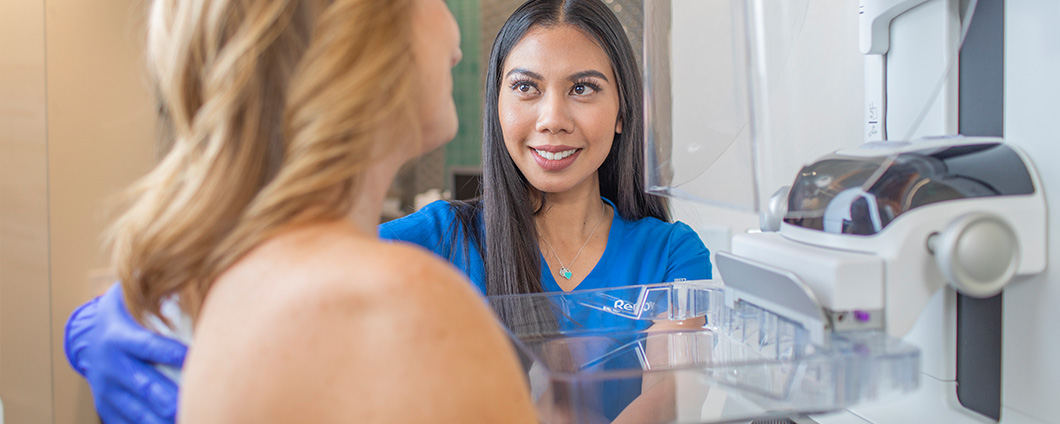Search
Results for 'primary care'
Clear-
Physiatry NEURO-REHABILITATION CLINIC
What is Physiatry? Physiatry (fuh·zee·a·tree) encompasses the diagnosis, prevention and treatment of all disabilities related to the brain, nerves, bones and muscles. The goal is to maximize physical functioning, significantly decrease or eliminate pain, foster independence and improve the quality of life for those with a disability, chronic pain and physical impairments.
-
Spine, Sports and Pain Management
How We Can Help You may benefit from treatment for neuromuscular (nerve, muscle and bone) disorders – that cause pain and impair normal functions. But, first, consult your primary care physician for a referral to Renown Health's Spine, Sport & Pain Management. Dr. Keating, Medical Director and his colleagues, Dr. Su and Dr. Storm, will customize a treatment plan that best suits your needs and lifestyle while providing the most effective care possible. For more information: Call 775-982-3608 | Fax 775-982-8001
-
What You Need to Know About RSV
Respiratory syncytial virus, also known as RSV, is a common respiratory virus that impacts the lungs and breathing pathways. The virus can be dangerous for infants and young children and is also concerning for older adults. While most older kids and adults only experience cold-like systems and recover in a week or two, an estimated 58,000-80,000 children younger than 5 years old are hospitalized due to RSV each year, and in 2022 healthcare organizations across the country are experiencing higher infection rates than in years past. "We are experiencing a strong RSV season and do not expect it to go away anytime soon," said Dr. Kris Wilson, Division Chief of Renown Children's Primary Care. "Infants who are infected with RSV almost always show symptoms of runny noses and cough. Call your healthcare provider immediately if your child is having difficulty breathing, is not drinking enough fluids, or is experiencing any worsening of these symptoms.” Symptoms of RSV: Runny nose Decrease in appetite/inability to drink Dry diapers, an indication of dehydration Cough, which may progress to wheezing or difficulty breathing Irritability (most common in very young infants) Decreased activity (most common in very young infants) Decreased appetite (most common in very young infants) Apnea, pauses in breathing for more than 10 seconds (most common in very young infants) What to do if you think your child has RSV: Call your pediatrician! If you suspect your child might have RSV, consulting their healthcare provider is the best first line of defense. From here they will help you build an appropriate treatment plan for child. Keep in mind that many pediatrician offices offer 24/7 call lines. If your child is experiencing retracted breathing (when the area between the ribs and in the neck sinks in when a person attempts to inhale), dehydration (not drinking and decrease in wet diapers) or apnea (pauses in breathing for more than 10 seconds) please call 911 or go to the closest emergency room.
-
Cancer Nurse Navigators
Cancer Nurse Navigators are dedicated professionals who guide and support patients through their cancer journey. Whether it's helping to connect patients with community resources or offering emotional support, our navigators are committed to ensuring that patients feel informed, educated and empowered throughout their cancer treatment. Personalized Care Every Step of the Way General inquiries and questions Communicate with your primary care doctors and specialists Understand the cancer diagnosis and medical terms Manage financial issues related to care Learn about clinical trial information Find community resources, support groups and complementary therapies No fee or referral is needed
-
Why Childhood Immunizations Are So Important
Immunizations save thousands of lives each year by preventing serious illnesses, hospitalizations, and deaths. They also protect those who can't be vaccinated, like young children and the elderly, through herd immunity. Renown Pediatrician Dr. Kristin Wilson highlights the crucial role of vaccines. Immunizations Your Child Needs (and when) Birth to 6 Months Hepatitis B: Shortly after birth, first vaccine dose Diphtheria, Tetanus, and Pertussis (DTaP), Polio, Haemophilus Influenza (HiB), Pneumonia, Hepatitis B and Rotavirus: Ages 2, 4 and 6 months, boosters and vaccines One Year to 18 Months MMR and Varicella (chickenpox) vaccine: Age 1, first vaccine dose Hepatitis A, HiB and Pneumonia: Age 1, booster DTaP: 15 months, fourth vaccine dose Hepatitis, second dose: 18 months Flu Vaccine: 6 months and older, annually* *In the year after receiving their first dose, an infant will need a booster one month later. Four Years Old MMRV, DTaP and Polio, final dose: Four years of age Pre-Teen and Beyond Tdap and Meningitis: Before starting middle school, children receive these vaccines. They are also old enough to start the HPV vaccine, an essential vaccine for all young adults to protect against cancer, genital warts and cervical dysplasia.
Read More About Why Childhood Immunizations Are So Important
-
What to Expect at a Well Child Checkup
A well-child checkup is a great opportunity to monitor your child’s growth and development, and it's also a chance to establish a trusting relationship with your child’s pediatrician and have your questions answered. What to Expect at Each Checkup At every checkup, a comprehensive physical examination will be conducted to assess your child's growth parameters, including height, weight and head circumference. A developmental assessment will evaluate the progress of your infant or young child in achieving age-appropriate milestones, encompassing language skills, motor development, problem-solving abilities and psycho-social skills. In addition, your pediatrician will address common concerns such as feeding, sleep patterns, oral health and general infant care. Unless there are specific needs or concerns for your baby, routine laboratory tests are typically unnecessary. Your pediatrician will provide guidance on immunization schedules, post-vaccination expectations and when to seek medical attention. Furthermore, during each visit, you will receive age-specific guidance to help you anticipate your child's expected growth and development, along with essential safety precautions and illness prevention measures. Your pediatrician will discuss various topics, such as placing your baby to sleep on their back, utilizing rear-facing infant car seats until around age two, maintaining home water thermostats below 120 degrees Fahrenheit, ensuring dangerous objects and poisonous substances are out of sight and reach, emphasizing dental health and promoting the use of bike helmets, among other things. Preparing for Your Visit It is recommended that, as a parent, you write down any questions beforehand, so you don’t forget them in the moment. Most importantly, feel comfortable asking your pediatrician about anything that might seem unusual, as you are the parent, and you know best! Before leaving the pediatrician’s office, be sure that you fully understand any instructions given to you and ask for clarification if needed. From your child’s birth through young adulthood, you will be visiting your pediatrician regularly. The American Academy of Pediatrics provides what a regular schedule might look like. Well-Child Checkup Schedule Two to three days after birth and at one month Two months Four months Six months Nine months One year 15 months 18 months 24 months 30 months Three years, and yearly after
-
10 Essential Questions to Ask at Your Child's Pediatrician Visit
Taking a few minutes to prepare for your child's pediatrician visit helps ensure that all your child's medical needs are met. Knowing the right questions to ask your provider can help you get the most out of your visit and ensure you and your child feel comfortable and informed. It is essential to base your questions on your child's specific health needs, but the ten options below are a great place to start. How is my child's overall health and development progressing? Is my child meeting their developmental milestones, and are there any areas where they may need extra support? What vaccinations does my child need, and are they up to date on all required immunizations? Are there any nutritional recommendations or concerns for my child's age and stage of development? What are some strategies for promoting healthy habits and physical activity for my child? Are there any warning signs I should look out for regarding my child's health or behavior? What can I do to help prevent common childhood illnesses like colds, flu strains or ear infections? What should I do if my child gets sick, and when should I seek medical attention? Are there any changes to my child's medication or dosage that I should be aware of? Is there anything else I should know or be aware of regarding my child's health or development?
Read More About 10 Essential Questions to Ask at Your Child's Pediatrician Visit
-
How to Talk to Your Children About Vaping
According to the Centers for Disease Control (CDC), e-cigarette use isn’t just up among adults, but it has also tripled in usage for teens. Dr. Jose Cucalon Calderon, a Pediatrics Physician at Renown Health and an Assistant Professor of Pediatrics at the University of Nevada, Reno School of Medicine, provides helpful insight into e-cigarettes and the dangers it poses to kids and teens. What Are E-Cigarettes? E-cigarettes are electronic nicotine delivery devices. e-cigarettes use liquid nicotine as an alternative to traditional smoked cigarettes. e-cigarettes contain nicotine which is an addictive substance with known toxic side effects that, when released in very high doses, that can have health consequences and causes addiction. Nicotine is described as “toxic,” but the most "toxic" part of e-cigarettes' is everything else within the E-juice. Nicotine mainly keeps people coming back for more. According to the CDC, e-cigarettes are also advertised using the same themes and tactics that have been shown to increase youth use of other tobacco products, including cigarettes. In 2021, approximately 76% of students reported exposure to tobacco product marketing through traditional sources, and approximately 74% of students who used social media had seen e-cigarette–related content. What Does This Mean for the Health My Teen? We know that nicotine can affect brain development in kids and teens, so it is important to educate your teen on the risks of exposure. If you have young children in the home, it is important to be vigilant as well. One teaspoonful of liquid nicotine can be fatal for a young child. How Do I Monitor My Teen for E-Cigarette Use? Monitoring your children can be tricky for parents. E-cigarettes can be harder to detect, unlike traditional cigarettes that were easy to detect by smell and residual odor. E-cigarette use, or “vaping,” is often associated with a dry cough or chronic throat/mouth irritation. Overall, increasing research shows strong links between mental health conditions and posterior combustible tobacco use along with increased risk of marijuana use. Nicotine is addictive, but it does not cause altered mental status like the other drugs of abuse can. All parents are strongly encouraged to talk to their children about the potential dangers of e-cigarettes. What are the health risks of vaping? Vaping devices have been on the market for a relatively short period of time, with evidence-based health effects and complications still being discovered. Vaping effects poses many harmful risks to children and teens. The risks of vaping include: Chest pain Difficulty breathing Dizziness Headaches Impaired response to infection in the airway Inflammatory problems of the airway Nausea Nicotine addiction Seizures Vomiting For more information for both parents and teens about quitting smoking or vaping, you can click here. Parents can also use this tip sheet from the U.S. Surgeon General to talk to their child about vaping. The Substance Abuse and Mental Health Services Administration free national helpline number is 1-800-662-4357 (HELP). It is available 24/7, 365 days a year offering confidential treatment referral and information (in English and Spanish). If you or someone you know is facing a substance (or mental health) problem, please reach out to them.
-
Renown Health and Aetna® Announce Contract Agreement
Renown Health and Aetna, a CVS Health Company, have reached a new, multi-year agreement that allows Aetna members to maintain in-network access to Renown Medical Group primary care and specialist physicians and advanced practitioners, Renown’s Urgent Cares and hospitals including Renown Regional Medical Center; Renown South Meadows Medical Center; Renown Children’s Hospital and Renown Rehabilitation Hospital. Both organizations worked diligently to reach a fair agreement without impacting patient care for current Aetna members. The agreement protects affordability and provides Aetna members with access to premier healthcare services, physicians, and facilities. “Renown’s agreement with Aetna further demonstrates our mission as a charitable, not-for-profit academic health system to ensure access to quality healthcare,” said Brian Erling, MD, MBA, President, and CEO of Renown Health. “As doctors, nurses, and caregivers, we want to provide the greatest access, experience, and highest-quality care for our community including those insured by Aetna. Together, we are poised to positively impact the lives of thousands of families in our region, providing them with the comprehensive coverage and support they need to lead better, healthier lives.” “We are committed to serving Aetna members with access to quality, convenient, affordable care through our network of providers,” said John Wagner, Aetna Chief Network and Operations Officer for Nevada. “We are pleased to reach an agreement with Renown Health that enables us to continue working together to meet the health care needs of our members across northern Nevada.” Renown Regional Medical Center has been named the #1 Hospital in Nevada by US News & World Report for the past three years as the best hospital for patients with complex, life-threatening, or rare conditions for the last two years and rated highest in NV in eight specialty areas including, Cancer; Cardiology & Heart Surgery; Diabetes & Endocrinology; Gastroenterology & GI Surgery; Nephrology; Neurology & Neurosurgery; Orthopedics; Pulmonology & Lung Surgery. Renown South Meadows Medical Center in south Reno has earned an “A” Hospital Safety Grade from The Leapfrog Group, the nation’s premier advocate of transparency in health care. This national distinction recognizes Renown Health’s national accomplishments in ensuring safe, high-quality hospital care for patients. Consumers with questions can contact by using the toll-free number on the back of their current insurance identification card or visit www.aetna.com. About Renown Health Renown Health is the region’s largest, locally governed, not-for-profit integrated health care network serving Nevada, Lake Tahoe, and northeast California. With a diverse workforce of more than 7,400 employees, Renown has fostered a longstanding culture of excellence, determination, and innovation. The organization comprises a trauma center, two acute care hospitals, a children’s hospital, a rehabilitation hospital, a medical group and urgent care network, and the locally owned not-for-profit insurance company, Hometown Health. For more information, visit renown.org. About Aetna Aetna®, a CVS Health business, serves an estimated 34 million people with information and resources to help them make better informed decisions about their health care. Aetna offers a broad range of traditional, voluntary, and consumer-directed health insurance products and related services, including medical, pharmacy, dental and behavioral health plans, and medical management capabilities, Medicaid health care management services, workers' compensation administrative services and health information technology products and services. Aetna's customers include employer groups, individuals, college students, part-time and hourly workers, health plans, health care providers, governmental units, government-sponsored plans, labor groups and expatriates. For more information, visit www.aetna.com and explore how Aetna is helping to build a healthier world.
Read More About Renown Health and Aetna® Announce Contract Agreement
-
Renown Announces Promotion of Dr. Bradley Nelson as New Division Chief and Director of Cardiovascular Services
Dr. Nelson embraces a patient-centered approach to delivering comprehensive cardiac and vascular care. Renown Health is proud to announce the promotion of Bradley C. Nelson, MD, MBA, FACC, FSCAI to the position of Division Chief and Director of Cardiovascular Services, effective immediately. In this important physician leadership role within Renown Medical Group and the University of Nevada, Reno School of Medicine, Dr. Nelson will support clinical medical staff, community physicians and administrative leaders to drive operational performance, provider engagement, recruitment, strategic planning, analysis, and implementation of clinical care, education, and research across Renown Health and UNR Med. The Division chief also serves as the Director of Cardiovascular Services at Renown Health. In this role, Dr. Nelson will focus on the growth and alignment of Vascular and Cardiothoracic surgery and will help develop and oversee General Cardiology, Interventional Cardiology, Electrophysiology, Heart Failure, Cardiac Rehabilitation, Cardiac Imaging, and the Women’s Heart Center. Dr. Nelson has served as Interim Administrative Medical Director of Cardiology for the Renown Institute of Heart and Vascular Health since Dr. Jayson Morgan relocated in June. “Dr. Bradley Nelson is a collaborative physician, researcher and mentor who cares deeply about improving the health of our community,” said Samuel K. Weller, MHPA, who serves as CEO for Renown South Meadows Medical Center, Renown Rehabilitation Hospital and oversees the Cardiovascular service line. “We are pleased to promote an extraordinary physician like Dr. Nelson to lead and further develop cardiovascular services to serve the needs of our growing community. This is an exceptionally exciting time for Renown Health’s Heart and Vascular Services and Dr. Nelson’s leadership will be key in crafting our vision to offer more efficient and affordable care, elevate the patient experience, and advance health equity across northern Nevada. We are excited to have Dr. Nelson at the helm of our cardiovascular program.” Dr. Bradley Nelson is a highly regarded interventional cardiologist and physician leader. With over 12 years of experience in the field, Dr. Nelson specializes in interventional cardiology, focusing on minimally invasive procedures to manage heart conditions and has a particular focus on treating chronic total occlusions (CTOs) of the coronary arteries. Dr. Nelson earned both his Medical Degree and Master of Business Administration degrees from the University of Colorado and completed his medical training at Stanford University, the University of California San Diego, and Oregon Health & Science University. He holds an academic appointment as Clinical Assistant Professor of Internal Medicine at the University of Nevada, Reno School of Medicine. Dr. Nelson is Board Certified in four specialties including Cardiovascular Disease, Interventional Cardiology, Cardiovascular Computerized Tomography, and Nuclear Cardiology. He is a fellow of the Society for Cardiovascular Angiography and Intervention (SCAI) and the American College of Cardiology (ACC). Dr. Nelson’s previous translational research focused on gene therapy strategies for the management of rare genetic disorders, and he has patented technology for treating Danon disease that is now in FDA pivotal clinical trial stage. He currently participates in clinical research trials focused on hypertension, lipoprotein(a) reduction, atherosclerotic plaque regression, and early treatment of non-obstructive coronary artery disease. He is a member of the American College of Cardiology (ACC) Early Career Advocacy Work Group and has served as a State Representative for the ACC Legislative Conference for the past three years. Dr. Nelson is nationally recognized for his expertise in managing complex cardiac conditions and maintains active involvement in speaking and publishing. To make an appointment with a provider at Renown’s Institute for Heart and Vascular Health, request that your primary care provider make a referral. For more information visit renown.org/Health-Services/Heart-Care. As the region’s only Level 2 Trauma Center for adults and children, Renown serves over 1 million people and 100,000 square miles. In U.S. News and World Report Best Hospital Rankings, Renown Regional Medical Center is named #1 Hospital for the State of Nevada for 2024, 2023 and 2022. About Renown Health Renown Health is the region’s largest, locally governed, not-for-profit integrated health care network serving Nevada, Lake Tahoe, and northeast California. With a diverse workforce of more than 7,500 employees, Renown has fostered a longstanding culture of excellence, determination, and innovation. The organization comprises a trauma center, two acute care hospitals, a children’s hospital, a rehabilitation hospital, a medical group and urgent care network, and the locally owned not-for-profit insurance company, Hometown Health. For more information, visit renown.org.
-
Breast Cancer Screening
Renown Women's Health recommends the following breast exam guidelines: Age 18-39: Consult your primary care provider for a Formal Risk Assessment and start breast exams at age 25. Age 40+: Annual mammograms. Family History: Begin screening 10 years before your family member's diagnosis age. For example, start at age 35 if a family member was diagnosed at 45. Self-awareness: Be familiar with the look and feel of your breasts and report any changes to your care provider. Age 75+: Annual mammograms if life expectancy exceeds five to seven years.
-
10 Facts About Seasonal Affective Disorder
Seasonal Affective Disorder (SAD) is a form of depression linked to seasonal changes. Learn to recognize the symptoms of SAD in your kids (or yourself) should they appear. We checked in with Dr. Vanessa Slots, the Division Chief of General Pediatrics at Renown to help us understand this condition. 1. Blame SAD on the sun—or the lack of it Seasonal Affective Disorder is a more severe form of the “winter blues. Over-sleeping, feeling irritable or unhappy, and withdrawing from people are classic symptoms of SAD. Approximately 90 percent of people with SAD experience depressive symptoms yearly in the fall and winter, while about 10 percent have depression in the spring and summer. The causes of SAD aren’t explicitly known. Still, researchers believe it’s related to a change in circadian rhythms, with differences in the amount of sunlight during different times of the year as one factor. 2. The further north you live, the more common SAD becomes While Seasonal Affective Disorder is predominantly an adult condition, estimates are that one million children in North America have it. Interestingly, SAD does not occur in the tropics. 3. SAD is more recognizable in adults than in children Common symptoms include feeling “empty,” pessimistic, hopeless, short-tempered, restless and not knowing what to do with oneself. Symptoms vary greatly from one individual to the next. SAD is more common in women than in men. When symptoms are severe, physical examinations are required to rule out other medical causes and determine whether antidepressant medication is needed. 4. In teenagers, symptoms tend to revolve around school-related issues Schoolwork suffers, students have difficulty getting up in the morning and arriving late for class, homework is incomplete, and grades may plummet. Afflicted students have difficulty concentrating, remembering details and making decisions. They lose interest in activities that they previously enjoyed. Some teenagers tend to overeat, crave carbohydrates such as pasta and gain weight. Many teachers, school counselors and therapists should be more familiar with Seasonal Affective Disorder.









